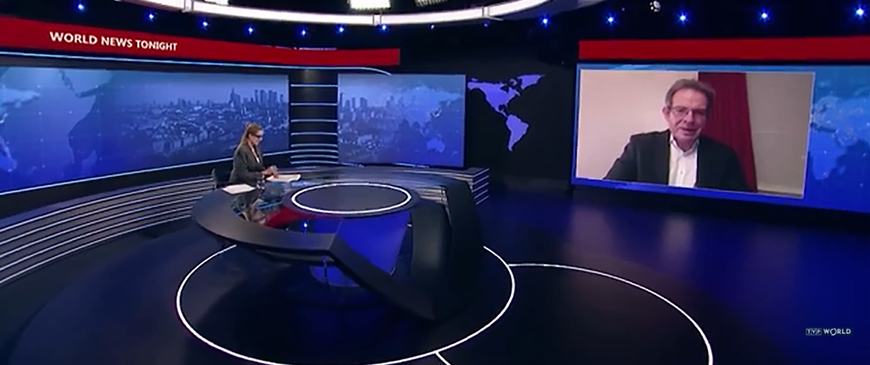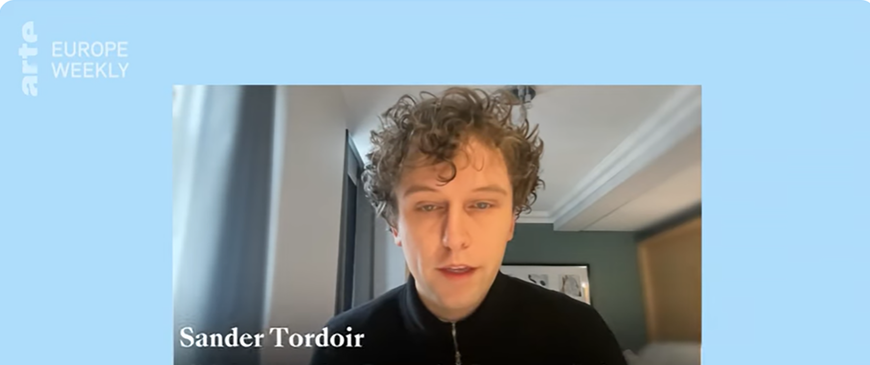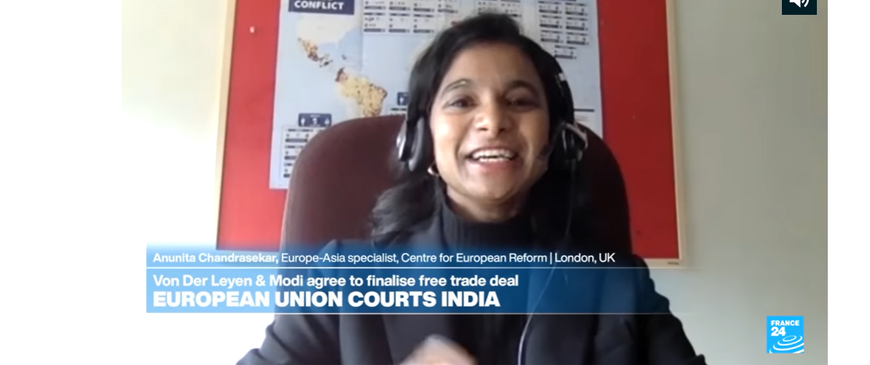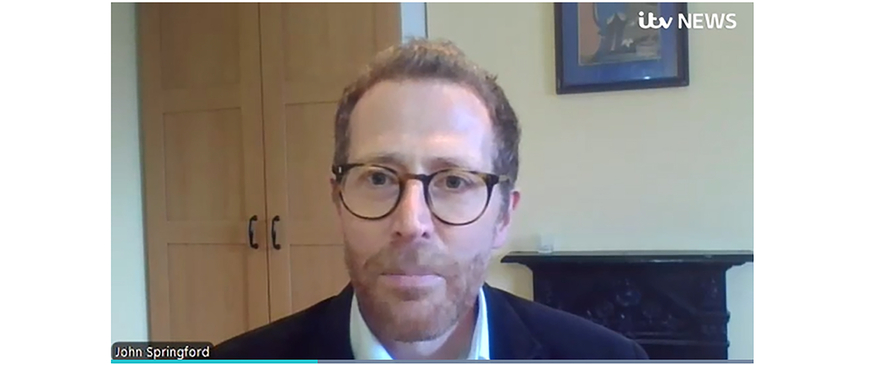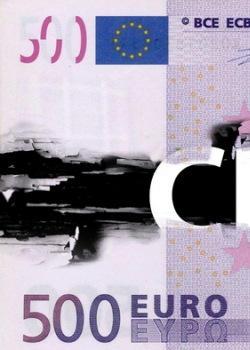Press
As Germany's economy rebounds, anxiety prevails
23 July 2010
NPR
"If German wages are falling, falling by 1.5 percent, the Greeks and the Italians, etc., have to make sure that their wages fall by even more than that. Now, that spells slump or at least very, very weak growth. Very weak growth or slump is lethal for economies as indebted as these economies, because slump, deflation implies increases in the real value of debt." [Simon Tilford] warns that another giant obstacle to Germany's speedy recovery is what he calls the country's dangerous over-reliance on exports. ...
Tests of EU banks are a whitewash, some critics say
22 July 2010
Los Angeles Times
"It doesn't test the banks for what investors are fearful of," said Simon Tilford, chief economist at the Centre for European Reform in London. "Stress tests are the way to go, but of course the tests have to be tough enough.... I don't think these tests are of particularly enormous value."
Opportunity for EU sway in Ukraine
21 July 2010
New York Times
"There is a massive sense of frustration in Brussels because no matter what the EU offers, it receives only empty promises by the Ukrainian authorities," said Katinka Barysch, deputy director of the Centre for European Reform in London.
Those work-shy Europeans
19 July 2010
Presseurop
In Europe, argues Simon Tilford, chief economist at the Centre for European Reform think tank, many let others foot the bill for their time off. For example by claiming, in the name of social justice, early retirement for which they have not paid contributions. It's absurd, he says. In the long run, Tilford continues, the European model of exchanging money for leisure time is in jeopardy. ... If Europeans succeed in growing their productivity, concludes Tilford, they can continue cultivating their love of leisure.
EU chief slates Obama's attitude to Europe
15 July 2010
Sky News
Philip Whyte from the Centre for European Reform told Sky News: "Essentially the Europeans feel as though they are being neglected...But if you look at the view from behind Obama's desk, Europe is not very high on his list of priorities. He has more pressing problems such as Iran, Afghanistan and China to deal with and, as far as he is concerned, Europe is not going to be much help in solving them so why invest time and energy in the relationship."
Barack Obama's relationship with Europe 'not living up to its potential'
15 July 2010
The Telegraph
Hugo Brady, of the Centre for European Reform, said: "Obama was always overblown as a symbol because US foreign policy interests tend not to change. The US does not understand the need for everyone to be around the table at the EU, which they find as frustrating as a mini-UN where people want to talk about the good things they have done."
Germany's euro advantage
13 July 2010
International Herald Tribune
Prior to the introduction of the euro, European economies running big trade deficits routinely devalued their currencies against the Deutschmark and other currencies tied to it. This prompted allegations of beggar-thy-neighbor activity and even calls for protectionism.
Could Russia join NATO?
12 July 2010
The Economist
An interesting article by Tomas Valasek at the Centre for European Reform, a London think tank, looks at the pros and cons of Russia joining NATO, or at least changing its relationship with the alliance. He was one of a bunch of western security policy specialists invited by their Russian counterparts to discuss the issue. As he notes, the atmospherics have clearly changed in recent months. ... Another suggestion examined by Mr Valasek is that NATO and Russia should 'demilitarise' their relationship.
European security: Take China seriously
12 July 2010
NewEurope
In January 2010, Charles Grant of the Centre for European Reform noted that attitudes toward China were becoming "prickly".
Lunch with the FT: Baroness Ashton
09 July 2010
Financial Times
According to the Centre for European Reform, a pro-EU think tank, around 80 per cent of the EU's foreign policy failures are due to the inability of larger member states to arrive at a common position.... But Charles Grant, the CER's director, says creating a more effective institution to replace the confusing way foreign policy was split between the rotating presidency, the council of ministers and the commission, is overdue.
Europe puts limits on banker bonuses
07 July 2010
The Christian Science Monitor
"It's a directive and leaves some leeway to member states to implement the legislation, having regard to domestic conditions," explains Philip Whyte, an analyst at the Centre for European Reform, a London-based think tank. … Mr Whyte says that his main worry about the new rules concerns what he says is a tendency in some quarters of Europe to believe that all that was largely needed to stabilize financial systems was to curb bonuses and regulate hedge funds.
So much for the European project
07 July 2010
The American Spectator
Charles Grant, director of the Centre for European Reform, complained: "On many of the world's big security problems, the EU is close to irrelevant."
China's new silk road into Europe
04 July 2010
The Telegraph
But Katinka Barysch, deputy director of the Centre for European Reform, says that it was unlikely the Chinese investment in Greece will be of such a "vulture" nature. "The danger that Cosco will behave like some of the Chinese mining and oil companies in Africa is pretty remote … Greece is a member of the EU, so it has a much more solid legal framework. There are clear constraints about what foreign investors can and cannot do in our markets.
EU plans budget discipline measures
01 July 2010
The Wall Street Journal
Simon Tilford of the Centre for European Reform in London said the commission plan "assumes that all the imbalances can be addressed by the deficit countries." Germany must play a role too in stimulating its consumption, Mr Tilford said. "Any system of governing the eurozone that ignores the structural problems that we see in the surplus countries is doomed to fail... Nobody wants to weaken any countries' export performance," he said.
German austerity draws flak
25 June 2010
The Gazette
Centre for European Reform chief economist Simon Tilford said in an interview yesterday that Germany isn't "giving any thought to how their austerity (and neglect of economic growth) will impact on the rest of the world."
It's 'America the swift' in bank reform
25 June 2010
New York Times
"European policymakers are being slow, almost unforgivably slow, in making changes because of the belief that Americans were almost exclusively to blame for the crisis," said Simon Tilford, an economist at the Centre for European Reform in London. But, he said, "they also engaged in similar banking practices — there was a similar property boom here, similar excessive mortgage lending."
ANALYSIS - Europe tries to fill leadership void in crisis
24 June 2010
Reuters
"It's clear that when it comes to a response to the eurozone crisis, Germany is managing to stamp its view on the others," said Simon Tilford, chief economist at the Centre for European Reform think tank in London. … "Unless they address the underlying issues, there could be defaults and recession," Tilford said.
Battered eurozone left vulnerable to crisis, warns Fitch
21 June 2010
The Telegraph
"What we have seen, how markets have reacted on Greece, on other countries, and in particular rating agencies, this was done in an irresponsible way, an irresponsible way in the case of Greece," he said at a Centre for European Reform event in London.
What is happening in EU, eurozone politics?
21 June 2010
Reuters
"They [the left] may have more flexibility on what they can offer while in opposition," said Katinka Barysch, deputy director of the CER. "But they will have the same problem as everyone else once they win elections - that there isn't any money."
Erdogan rebuffs US, insists Turkey isn't Iran ally
17 June 2010
Bloomberg
Divergence from the US on Iran is "not an anti-American move, it's a pro-Turkey move that happens to benefit Iran," said Katinka Barysch, an analyst at the Centre for European Reform in London. Erdogan's move away from lockstep with the West increases his credibility in the region, which means "we can use Turkey's access to countries like Syria and perhaps even to Hamas for mediation," Barysch said.

